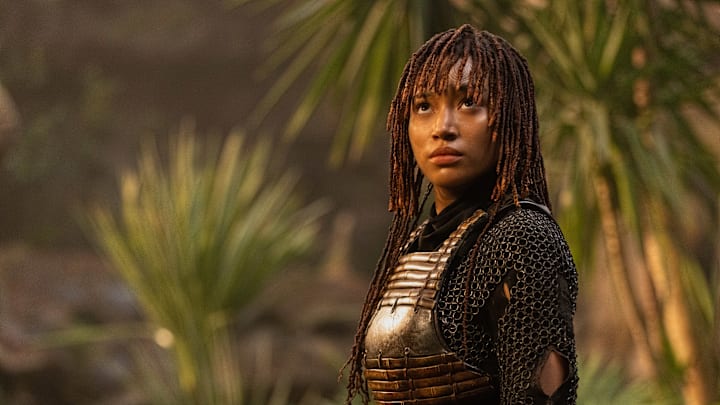There are many moments to discuss from the first two episodes of Star Wars: The Acolyte, but one line piqued my interest above all others. In Episode 2 of the TV series "Revenge/Justice," assassin Mae attempts to attack her Jedi target but is repulsed by an invisible Force. She is compelled to flee but returns with a different attack the next day. Approaching the meditating Master Torbin, who hasn't spoken in a decade, she taunts, "I know why you took the Barash Vow."
Director Leslye Headland has said that no homework is needed to watch this series, but as soon as the episode wrapped, I had to look up the Vow. After all, I could imagine it as a plea deal, non-disclosure agreement, or even invoking the Fifth Amendment in the American justice system. He maintains the silence pact for ten years until Mae hunts down the criminal Jedi who left her with unfinished business. But the next line of dialogue raises some questions.
"You thought this life would give you the peace you seek. But your past still haunts you."Mae,
I had to know what exactly was meant by "this life," which led to studying. Sorry, Leslye.
What is the Barash Vow?
The first appearance of the Barash Vow was penned by High Republic writer Charles Soule in the 2017 run of Darth Vader. The High Republic part is important to swing back to in a moment. After the events of Order 66, Darth Vader hunts a Jedi who has taken the Vow named Kirak Infil'a. It was a unique view of a different kind of Jedi that fans had never seen before.
The Vow was built from there, primarily in the High Republic era. Soule would return to flesh out its origins in The High Republic: The Blade #4. This 2023 comic is where a Jedi named Barash Silvain, after whom it was named, is part of an effort to end a conflict and break a siege in 382 BBY. However, she made a grave mistake on the mission, one she regretted deeply. Its original intention is simply put:
"I cannot trust myself. I cannot allow you, or any other Jedi, to trust me. Not until I know I am hearing the Force clearly again. I will go... I am still a Jedi and always will be. But until I regain my certainty… I must listen. I will take no action on behalf of the Order."Barash Silvain
Barash resolved to this life after she let her own biases come before the will of the Force, and it's appropriate that Torbin claims he thought he was doing the right thing. After ten years, he still feels conflicted enough to accept Mae's lethal forgiveness.
This calls to mind two other practices, one from Star Wars Legends and one from the Sequel Trilogy. In Dave Wolverton's The Courtship of Princess Leia, one of the witches of Dathomir reveals a ritual of penance undertaken by a penitent:
"There is a woman of our clan who joined the Nightsisters, but has recently left them at a great price... She is fighting to cleanse herself. She has committed unspeakable atrocities that have left a great mark upon her. She is forsaken."Mother Augwynne
This practice is from the days long before the Nightsisters were revamped and reintegrated to be a major part of recent canon, but the "great mark" referred to by Augwynne is echoed in Mae's claim that Torbin's past still haunts him.
The same could be said of Luke Skywalker's self-imposed exile in the sequel trilogy. When Rey realizes that Luke has cut himself off from the Force, he responds with an explanation of his decision:
" I've seen this raw strength only once before in Ben Solo. It didn't scare me enough then. It does now."Luke Skywalker
According to Charles Soule's Darth Vader comic series, part of the Barash Vow is that a Jedi will not take on an apprentice. Luke is in a state in which he "will take no action on behalf of the Order" and refuses to take Rey as an apprentice. It is never clearly stated, but it could be argued that Luke Skywalker is the latest of the fourteen thousand Jedi who took the Vow.
With only two episodes released with The Acolyte, Mae's spiritual future is far from certain, but if redemption is to come, we have to wonder if her knowledge of Barash's practices will help her.
